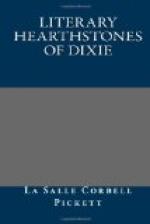I did not see the three dogs and seven cats—mystic numbers!—but felt confident that my genial host could not have been satisfied with any less.
The charmed circle in which Br’er Fox and Br’er Rabbit shone as social stars is yet with us, and we shall not let it go out from our lives. The mystic childhood of a dim, mysterious race is brought to us through these beings that have come to us from the olden time “when animals talked like people.”
“The Sign of the Wren’s Nest” is peopled by these legendary forms with their never-dying souls. They lurk in every corner and peer out from every crevice. They hide behind the trees, and sometimes in the moonlight we see them looking out at us as we walk along the path. They crouch among interlacing vines and look at us through the lacy screen with eyes in which slumber the traditions of the ages.
We look for the Magician who, with a wave of the hand, made all these to live and move before us. We know he must be there. We “cannot make him dead”; but he can make himself and us alive in the life of the past. A little door, with one shutter of Memory and one of Faith, opens before us, and he comes to dwell again in the world which he created in “The Sign of the Wren’s Nest.”
“THE POET OF THE FLAG”
FRANCIS SCOTT KEY
Away back in the years, Terra Rubra, the colonial home of John Ross Key, spread out broad acres under the sky of Maryland, in the northern part of Frederick County. Girt by noble trees, the old mansion, built of brick that came from England in the days when the New World yet remained in ignorance of the wealth of her natural and industrial resources, stood in the middle of the spacious lawn which afforded a beautiful playground for little Francis Scott Key and his young sister, who lived here the ideal home life of love and happiness. Among the flowers of the terraced garden they learned the first lessons of beauty and sweetness and the triumph of growth and blossoming. At a short distance was a dense line of forest, luring the young feet into tangled wildernesses of greenery and the colorful beauty of wild flowers in summer, and lifting great gray arms in solemn majesty against the dun skies of winter. Through it flowed the rippling silver of Pipe Creek on its sparkling way to the sea. At the foot of a grassy slope a spring offered draughts of the clear pure water which is said to be the only drink for one who would write epics or live an epic. Beyond a wide expanse of wind-blown grass the young eyes saw the variant gray and purple tints of the Catoctin Mountains, showing mystic changes in the floodtide of day or losing themselves in the crimson and gold sea of sunset.
In this stately, old, many-verandaed home, looking across nearly three thousand acres of fertile land as if with a proud sense of lordship, the wide-browed, poet-faced boy with the beautiful dreamy eyes and the line of genius between his delicately arched brows passed the golden years of his childhood.




